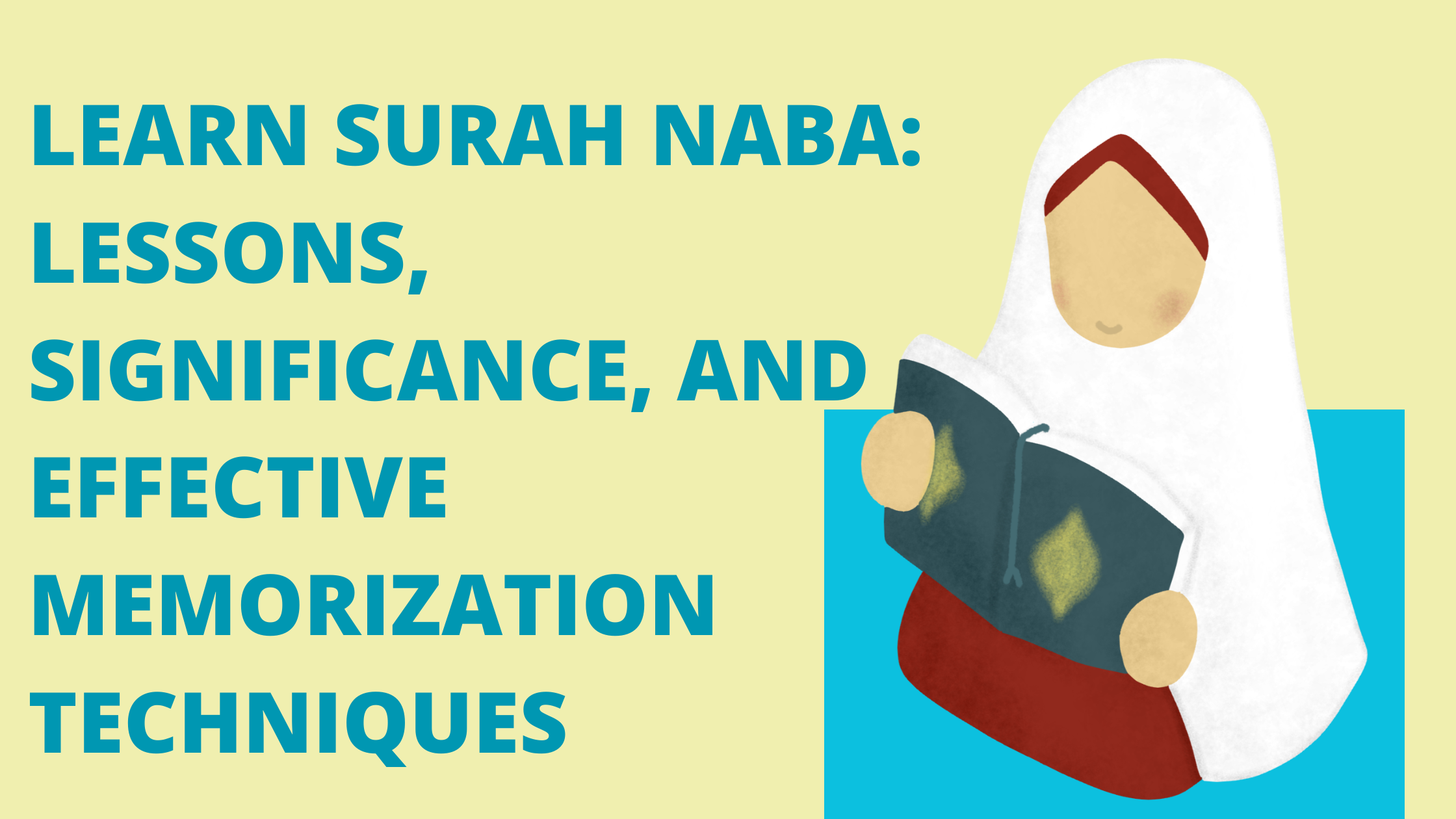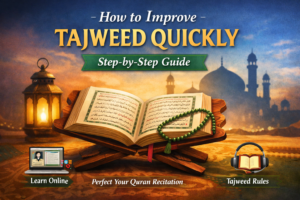Surah Naba, the 78th chapter of the Quran, stands as a profound testament to the divine wisdom and guidance bestowed upon humanity.
This chapter revealed in Makkah, serves not only as a reminder of the ultimate Day of Judgment but also as a beacon of spiritual enlightenment and moral rectitude for believers across generations. Its verses vividly depict the realities of resurrection, accountability, and the everlasting consequences of faith and disbelief.
Surah Naba opens with a powerful proclamation, “What are they asking one another about?” (Quran 78:1), prompting reflection on the purpose of existence and the responsibilities of mankind.
Through a series of rhetorical questions and vivid descriptions of the Day of Reckoning, it challenges humanity to contemplate the transient nature of worldly pursuits and prioritize spiritual preparedness.
In this article, we embark on a journey through Surah Naba to unravel its profound teachings and timeless relevance. By delving into its themes of divine justice, mercy, and the moral obligations of believers, we seek to illuminate the path toward spiritual growth and ethical conduct in today’s world.
Table of Contents
What is Surah Naba?
Surah Naba (The News) is the 78th chapter of the Quran, consisting of 40 verses. It is the first chapter in the final section of the Quran and is also known as Surah “Amma Yatasa’aloon” or simply “Amma”.
It belongs to the Meccan surahs, meaning it was revealed in Mecca before the migration to Medina. This surah addresses the themes of the Resurrection and the Day of Judgment, emphasizing the reality and certainty of the afterlife.
The Surah opens with a rhetorical question about what people are questioning and proceeds to describe the day when everyone will be resurrected and judged for their deeds.
The imagery in the surah vividly illustrates the signs of God’s creation, such as the earth, mountains, sleep, night, and day, to remind humans of God’s power and the inevitable end of their worldly life.
The latter part of Surah An-Naba focuses on the contrasting fates of the righteous and the wicked in the afterlife. It depicts the severe punishments awaiting the deniers and the magnificent rewards for the believers.
The surah serves as a stern warning to those who reject the truth and a reassurance to those who remain steadfast in faith. By highlighting the temporary nature of the world and the eternal nature of the afterlife, it calls people to reflect on their lives and prepare for ultimate accountability before God.
What are the Lessons in Surah Naba?
Surah An-Naba serves as a powerful reminder of the transient nature of this world and the certainty of the afterlife. It encourages believers to stay steadfast in their faith and deeds, emphasizing that the reality of the Day of Judgment is undeniable and that everyone will be accountable for their actions.
Illustrating the contrast between the fate of the righteous and the wicked, inspires a sense of urgency and responsibility in preparing for the hereafter.
Here are some essential lessons in Surah Naba:
1. Admonishing the Polytheists
The surah begins by addressing the questioning of the disbelievers about the Quran and its message. It particularly focuses on their skepticism regarding monotheism and the resurrection.
The surah warns them of the severe consequences if they persist in their disbelief and denial, emphasizing that the truth of the resurrection and the Day of Judgment is undeniable.
2. Evidence of God’s Oneness and Power
Surah An-Naba provides compelling evidence of Allah’s Oneness and His immense power. It draws attention to the natural phenomena and the creation around us as signs of God’s omnipotence, reinforcing the belief in resurrection by highlighting God’s ability to create and recreate life.
3. Description of the Day of Judgment
The surah offers vivid descriptions of the events and horrors that will occur on the Day of Judgment. These descriptions are intended to evoke a sense of fear and urgency, reminding believers of the gravity of that day and the importance of preparing for it through righteous deeds.
4. Punishment for Disbelievers
Surah An-Naba details the severe punishment awaiting disbelievers in Hell. It describes the conditions of Hell and the endless torment that the disbelievers will face, serving as a stark warning to those who reject the truth.
5. Reward for the Righteous
Conversely, the surah highlights the rewards that await the righteous in Paradise. It describes the eternal bliss and the magnificent bounties prepared for those who believe and lead a life of piety and righteousness.
This contrast between the fates of the righteous and the wicked serves to motivate believers to strive for righteousness.
6. Certainty of the Day of Judgment
The surah reaffirms the inevitability of the Day of Judgment, urging people to prepare for it by engaging in good deeds. It emphasizes that the day will come without a doubt, and on that day, everyone will be held accountable for their actions.
7. Urging Righteous Deeds
The surah serves as a warning for everyone to engage in righteous deeds before the Day of Judgment arrives. It vividly portrays how disbelievers will regret their actions and wish they were mere dust, highlighting the urgency of repentance and righteous living.
In essence, Surah An-Naba stands as a cornerstone in the Quranic narrative, bridging the profound themes of faith, accountability, and the afterlife.
This surah not only admonishes disbelievers but also provides believers with a clear path toward righteousness by presenting the stark realities of the Day of Judgment, the inevitable resurrection, and the contrasting fates of the pious and the wicked.
Importance and Virtues of Surah An-Naba
The virtues of Surah An-Naba lie in its ability to remind, warn, and inspire. Its significance is highlighted by the Prophet Muhammad’s (PBUH) frequent recitation and the profound impact it had on him.
It calls upon the believers to reflect on the signs of Allah’s power in the natural world, to recognize the certainty of the hereafter, and to prepare earnestly for the day when all deeds will be laid bare.
Here is a breakdown of the importance and virtues of Surah An-Naba:
Gift to the Prophet (PBUH)
This surah is part of the “Mufassal” chapters, which were given to the Prophet Muhammad (PBUH) as a distinctive favor, setting him apart from previous prophets.
Wathila bin Al-Asqa reported that the Prophet (PBUH) said, “I was given the place of the Torah, the seven long chapters… and I was given superiority with the Mufassal.” These chapters are known for their concise and powerful messages.
Recitation by the Prophet (PBUH)
The Prophet Muhammad (PBUH) frequently recited Surah An-Naba during his night prayers, reflecting its spiritual significance and the profound impact its verses had on him.
This practice underscores the importance of the surah in daily worship and its role in reinforcing the messages of the Quran.
Impact on the Prophet (PBUH)
The weight of the messages contained in Surah An-Naba, along with other surahs like Hud, Al-Waqi’ah, Al-Mursalat, and At-Takwir, caused the Prophet Muhammad’s hair to turn gray. Abu Bakr reported that when he asked the Prophet (PBUH) what caused his hair to turn gray, he mentioned these surahs.
This highlights the profound emotional and spiritual impact these revelations had on the Prophet.
Through its powerful verses, Surah An-Naba encourages a life of piety, gratitude, and constant remembrance of the divine, underscoring the ultimate truth that success in this world and the next lies in sincere faith and righteous action.
What is the Main Message of Surah Naba?
Surah An-Naba centers around the themes of resurrection and the Day of Judgment. The surah opens by addressing the questions of the disbelievers about the Day of Resurrection, emphasizing its inevitability and the certainty of the events to come.
It begins by posing a rhetorical question about what people are inquiring: “About what are they asking one another?” and follows with a definitive answer that they are questioning the momentous event of the Day of Judgment, on which there is significant disagreement among them.
The surah then provides a vivid description of the cosmic upheavals and the manifestations of divine power that will occur on that day, stressing the magnitude and the reality of the resurrection and judgment.
The second major message of Surah An-Naba is the contrasting fate of the righteous and the wicked. The surah details the severe punishment awaiting the disbelievers in Hell, characterized by eternal torment and deprivation of comfort.
Conversely, it highlights the blissful rewards awaiting the righteous in Paradise, describing the lush gardens, abundant fruits, and perpetual satisfaction they will enjoy.
This stark contrast serves as both a warning and an encouragement: a warning to those who persist in disbelief and rebellion against God’s commands, and an encouragement to those who live righteously and adhere to the faith.
The surah thus underscores the importance of accountability and the moral choices individuals make, urging people to prepare for the inevitable reality of the Day of Judgment through sincere faith and righteous actions.
How to Learn to Read Surah Naba?
Learning to read Surah An-Naba requires dedication and practice, but with the right resources and guidance, it becomes a manageable and spiritually enriching journey.
By understanding the basics of Arabic, listening to recitations, learning Tajweed, practicing with a teacher, using learning apps, repeating verses, and joining study groups, you can master the recitation of this important surah.
Steps to Learn to Read Surah An-Naba:
1. Understanding the Basics of Arabic
Before diving into the recitation of Surah An-Naba, it is essential to have a basic understanding of the Arabic language, particularly the Arabic alphabet and pronunciation rules.
Familiarize yourself with the sounds and shapes of Arabic letters and practice combining them into words. This foundational knowledge will make it easier to read and pronounce the verses correctly.
2. Listening to Recitations
One of the most effective ways to learn Surah An-Naba is by listening to its recitation by experienced Qaris (reciters). Use online resources such as YouTube, Quran apps, or Islamic websites to find audio and video recordings.
Pay close attention to the pronunciation, intonation, and rhythm of the recitation. Repeatedly listening to the surah helps in memorizing its verses and understanding the correct pronunciation.
3. Learning Tajweed Rules
Tajweed refers to the set of rules governing the correct pronunciation of Quranic recitation. Enroll in a Tajweed class, either online or at a local mosque, to learn these rules.
Focus on mastering the articulation points of letters (Makharij) and the characteristics of each sound (Sifaat). Proper application of Tajweed ensures that you recite Surah An-Naba as it was revealed.
4. Practicing with a Teacher
Find a qualified teacher or Quran tutor who can guide you through the recitation of Surah An-Naba. A teacher can provide personalized feedback, correct your mistakes, and help you improve your pronunciation and fluency.
Regular practice sessions with a teacher will accelerate your learning process and ensure you are reciting the surah correctly.
5. Using Quran Learning Apps
Utilize modern technology by downloading Quran learning apps on your smartphone or tablet. These apps often include features such as audio recitations, Tajweed tutorials, and interactive exercises.
6. Repetition and Memorization
Consistent repetition is key to learning any surah. Recite Surah An-Naba daily, breaking it down into smaller sections if needed. Start by memorizing one verse at a time, gradually adding more verses as you become comfortable. Review previous verses regularly to reinforce your memory.
7. Joining a Quran Study Group
Joining a Quran study group can provide additional support and motivation. Group members can recite together, share tips, and help each other with difficult parts.
The communal aspect of learning can make the process more enjoyable and rewarding.
Through consistent effort and a sincere desire to connect with the words of Allah, you will find yourself growing in both knowledge and faith. Embracing this journey not only enriches your understanding of Surah An-Naba but also strengthens your overall relationship with the Quran, fostering a deeper sense of peace and fulfillment in your spiritual life.
How to Memorize the Surah Naba?
Memorizing Surah An-Naba is a rewarding spiritual endeavor that requires dedication, patience, and consistent effort. By setting clear goals, understanding the meaning, listening to recitations, breaking down the surah, repeating and revising, writing it down, incorporating it into prayers, using apps, joining study groups, and seeking guidance from a teacher, you can effectively memorize this important surah.
Here is a detailed guide on how to memorize Surah An-Naba:
1. Set Clear Goals and a Schedule
Begin by setting clear, achievable goals for memorizing Surah An-Naba. Decide how many verses you want to memorize each day or week. Creating a schedule will help you stay on track and make consistent progress.
For example, you might aim to memorize two verses per day, allowing you to complete the surah within a month.
2. Understand the Meaning
Understanding the meaning of the verses can significantly aid in memorization. Read the translation and Tafsir (exegesis) of Surah An-Naba to comprehend its message and themes. Knowing the context and meaning of the verses will make them more memorable and meaningful.
3. Listen to Recitations
Listening to recitations by skilled Qaris can help with memorization. Choose a reciter whose style you find clear and easy to follow. Listen to the recitation of Surah An-Naba multiple times daily. Pay attention to the pronunciation, rhythm, and intonation. Repetition through listening helps reinforce memory.
4. Break Down the Surah
Divide the surah into smaller sections or groups of verses. Memorize one section at a time, ensuring you have fully memorized each part before moving on to the next. Breaking down the surah into manageable parts makes the task less daunting and more structured.
5. Repeat and Revise
Repetition is key to memorization. Recite the verses you are memorizing multiple times throughout the day. Repeat each verse until you can recite it from memory without hesitation.
Regular revision is crucial; review previously memorized sections daily to ensure they stay fresh in your memory.
6. Write It Down
Writing down the verses can reinforce memorization. Write out each verse as you memorize it, paying attention to the correct spelling and structure. This physical act of writing helps imprint the verses in your memory and aids retention.
7. Recite in Salah (Prayer)
Incorporate the verses you are memorizing into your daily prayers. Reciting them during Salah helps reinforce memory and integrates your learning into your spiritual practice. This repeated exposure during prayer makes memorization more effective and meaningful.
8. Use Quran Memorization Apps
Take advantage of technology by using Quran memorization apps. Apps like Quran Companion, Memorize Quran for Kids & Adults, and Ayat provide interactive tools, audio recitations, and progress tracking to aid your memorization efforts.
These apps can be particularly helpful for structured learning and revision.
9. Join a Study Group or Find a Partner
Joining a Quran memorization group or finding a memorization partner can provide motivation and support. Reciting together allows for mutual correction, encouragement, and accountability.
Group study sessions can also offer additional insights and techniques for effective memorization.
10. Seek Guidance from a Teacher
A qualified Quran teacher can provide personalized guidance, correct your recitation, and help with Tajweed rules. Regular sessions with a teacher ensure you are memorizing correctly and can address any difficulties you encounter. Teachers can also provide additional resources and support.
Each step in this process not only enhances your memory but also deepens your connection to the Quran and enriches your spiritual life. With persistence and devotion, you will find the journey of memorizing Surah An-Naba to be both fulfilling and transformative.
How to Teach Kids to Memorize Surah Naba?
Teaching kids to memorize Surah An-Naba can be a rewarding and enriching experience. Here are some effective strategies to help children learn and memorize this surah:
1. Simplify the Language
Break down the surah into simple language that children can easily understand. Use age-appropriate explanations to convey the meaning, themes, and lessons of Surah An-Naba. This helps children grasp the context and significance of what they are memorizing.
2. Arts and Crafts
Integrate arts and crafts activities into the memorization process. Create a visual representation of Surah An-Naba using materials like construction paper, markers, and stickers.
Children can design their own Quranic verse bookmarks or posters, illustrating each verse with colorful drawings and symbols that represent its meaning.
3. Recite Together Regularly
Recite Surah An-Naba together with your children regularly. Start with small sections and gradually increase the length as they become more familiar. Encourage them to recite after you, focusing on correct pronunciation and Tajweed (rules of Quranic recitation).
4. Break It Down into Small Parts
Divide Surah An-Naba into smaller parts or sections for easier memorization. Focus on memorizing one or two verses at a time. Once a section is memorized, revise it frequently before moving on to the next part.
This approach keeps the memorization process manageable and less overwhelming for children.
5. Use Repetition and Practice
Repetition is key to memorization. Encourage children to repeat each verse multiple times throughout the day. Regular practice sessions, especially during quiet times such as after Salah (prayer), can help reinforce memory retention. Make it a daily routine to revise previously memorized sections.
6. Make it Fun and Interactive
Introduce games, quizzes, or activities related to Surah An-Naba to make learning enjoyable. For instance, create a scavenger hunt where children search for verses written on cards around the house.
Use storytelling or role-playing to narrate the meaning and context of the surah in an engaging manner.
7. Offer Positive Reinforcement
Praise and encourage children’s efforts and progress in memorizing Surah An-Naba. Offer small rewards or incentives for reaching memorization milestones, such as reciting a certain number of verses correctly.
Positive reinforcement boosts their motivation and confidence in memorizing Quranic verses.
8. Set Realistic Goals
Set realistic goals based on each child’s pace and abilities. Monitor their progress regularly and adjust the memorization plan accordingly. Celebrate achievements along the way to keep them motivated and eager to continue learning.
9. Lead by Example
Children often learn best by observing adults. Demonstrate your own commitment to memorizing Quranic verses, including Surah An-Naba. Recite the surah during family gatherings or Salah, showing them the importance and beauty of Quranic memorization.
10. Seek Guidance from Quran Teachers
If possible, enroll children in Quran classes or seek guidance from qualified Quran teachers. Teachers can provide structured learning, correct pronunciation, and Tajweed rules. They can also offer additional resources and support to enhance children’s memorization journey.
By employing these strategies with patience, encouragement, and consistency, you can effectively teach children to memorize Surah An-Naba. This not only instills the love of the Quran in their hearts but also strengthens their connection to Islamic teachings from a young age.
Surah Naba in Arabic with transliteration
Transliteration of Quranic verses is immensely helpful for beginners in several ways. It provides a phonetic guide to pronouncing Arabic text in a way that is more accessible to those who are not yet proficient in reading Arabic script.
This aids in recitation during prayers and enhances understanding of the meanings of verses. Here is Surah Naba in Arabic with transliteration to assist in its study:
Surah Naba in Arabic
بِسْمِ اللَّهِ الرَّحْمَـٰنِ الرَّحِيمِ
عَمَّ يَتَسَآءَلُونَ
عَنِ النَّبَإِ الْعَظِيمِ
ٱلَّذِى هُمْ فِيهِ مُخْتَلِفُونَ
كَلَّا سَيَعْلَمُونَ
ثُمَّ كَلَّا سَيَعْلَمُونَ
أَلَمْ نَجْعَلِ ٱلْأَرْضَ مِهَـٰدًۭا
وَٱلْجِبَالَ أَوْتَادًۭا
وَخَلَقْنَـٰكُمْ أَزْوَٰجًۭا
وَجَعَلْنَا نَوْمَكُمْ سُبَاتًۭا
وَجَعَلْنَا ٱلَّيْلَ لِبَاسًۭا
وَجَعَلْنَا ٱلنَّهَارَ مَعَاشًۭا
وَبَنَيْنَا فَوْقَكُمْ سَبْعًۭا شِدَادًۭا
وَجَعَلْنَا سِرَٰجًۭا وَهَّاجًۭا
وَأَنزَلْنَا مِنَ ٱلْمُعْصِرَٰتِ مَآءًۭ ثَجَّاجًۭا
لِّنُخْرِجَ بِهِۦ حَبًّۭا وَنَبَاتًۭا
وَجَنَّـٰتٍ أَلْفَافًا
إِنَّ يَوْمَ ٱلْفَصْلِ كَانَ مِيقَـٰتًۭا
يَوْمَ يُنفَخُ فِى ٱلصُّورِ فَتَأْتُونَ أَفْوَاجًۭا
وَفُتِحَتِ ٱلسَّمَآءُ فَكَانَتْ أَبْوَابًۭا
وَسُيِّرَتِ ٱلْجِبَالُ فَكَانَتْ سَرَابًۭا
إِنَّ جَهَنَّمَ كَانَتْ مِرْصَادًۭا
لِّلطَّاغِينَ مَـَٔابًۭا
لَّـٰبِثِينَ فِيهَآ أَحْقَابًۭا
لَّا يَذُوقُونَ فِيهَا بَرْدًۭا وَلَا شَرَابًا
إِلَّا حَمِيمًۭا وَغَسَّاقًۭا
جَزَآءًۭ وِفَاقًا
إِنَّهُمْ كَانُوا۟ لَا يَرْجُونَ حِسَابًۭا
وَكَذَّبُوا۟ بِـَٔايَـٰتِنَا كِذَّابًۭا
وَكُلَّ شَىْءٍ أَحْصَيْنَـٰهُ كِتَـٰبًۭا
فَذُوقُوا۟ فَلَن نَّزِيدَكُمْ إِلَّا عَذَابًۭا
إِنَّ لِلْمُتَّقِينَ مَفَازًۭا
حَدَآئِقَ وَأَعْنَابًۭا
وَكَأْسًۭا دِهَاقًۭا
لَا يَسْمَعُونَ فِيهَا لَغْوًۭا وَلَا كِذَّٰبًۭا
جَزَآءًۭ مِّن رَّبِّكَ عَطَآءً حِسَابًۭا
رَّبِّ ٱلسَّمَـٰوَٰتِ وَٱلْأَرْضِ وَمَا بَيْنَهُمَا ٱلرَّحْمَـٰنِ ۚ لَا يَمْلِكُونَ مِنْهُ خِطَابًۭا
يَوْمَ يَقُومُ ٱلرُّوحُ وَٱلْمَلَـٰٓئِكَةُ صَفًّۭا ۖ لَّا يَتَكَلَّمُونَ إِلَّا مَنْ أَذِنَ لَهُ ٱلرَّحْمَـٰنُ وَقَالَ صَوَابًۭا
ذَٰلِكَ ٱلْيَوْمُ ٱلْحَقُّ ۖ فَمَن شَآءَ ٱتَّخَذَ إِلَىٰ رَبِّهِۦ مَـَٔابًۭا
إِنَّآ أَنذَرْنَـٰكُمْ عَذَابًۭا قَرِيبًۭا يَوْمَ يَنظُرُ ٱلْمَرْءُ مَا قَدَّمَتْ يَدَاهُ وَيَقُولُ ٱلْكَافِرُ يَـٰلَيْتَنِى كُنتُ تُرَٰبًۭا
Transliteration of Surah Naba
Bismillah ir-Rahman ir-Rahim
1. `Amma yatas’aloon
2. `Anin-naba’il-‘azim
3. ‘Allazi hum feehi mukhtalifoon
4. Kalla sayya’lamoon
5. Thumma kalla sayya’lamoon
6. ‘Alam naja`lil-‘arda mihadan
7. Wal-jibala ‘awtadan
8. Wa khalaqnakum ‘azwajan
9. Wa ja`alna nawmakum subata
10. Wa ja`alna laylal-libasa
11. Wa ja`alna nahara ma`asha
12. Wa banayna fawqakum sab’an shidadan
13. Wa ja`alna sirajan wahhajan
14. Wa anzalna mina al-mu’asirati ma’an thajjajan
15. Li nukhrija bihi habbanw-wa nabata
16. Wa jannatin ‘alfafa
17. ‘Inna yawma alfasli kana miqata
18. Yawma yunfakhu fi ‘s-soori fa ta’toon ‘afwajan
19. Wa futihaatis-sama’u fa kanaat ‘abwaba
20. Wa suyyiratil-jibalu fa kanaat saraba
21. ‘Inna jahannama kanaat mirsada
22. Littaghina ma’aba
23. Labithina fiha ‘ahqaba
24. La yadhooqoona fiha bardanw-wa la sharaba
25. ‘Illa hameemanw-wa ghassaqan
26. Jaza’anw-wa wifqa
27. ‘Innahum kanoo la yarjoona hisaba
28. Wa kadhdhaboo bi’ayatina kithaba
29. Wa kulla shay’in ‘ahsainaahu kitaba
30. Faadhooqoo fala nazeedakum ‘illaa ‘adhaaba
31. ‘Innalilmuttaqeena mafaza
32. Hadaa’iquw-wa ‘anaba
33. Wa kawa`iba atraba
34. Waka’san dihaqan
35. La yasma`oona fiha laghwaw-wa la kithaba
36. Jazaaa’am-mir-Rabbika ‘ata’an hisaba
37. Rabbi as-samawati wal-ardi wa ma baynahuma ar-Rahman La yamlikoona minhu khitaba
38. Yawma yaqoomu ‘r-Ruhu wal-Mala’ikatu saffan, la yatakal-lamoona ‘illa man ‘adina lahu ‘r-Rahmanu wa qala sawaba
39. Dhaliqa yawmu al-haqq. Faman sha’a ittakhaza ila rabbihi ma’aba.
40. ‘Inna ‘an zarnakum ‘adhaban qariba yawma yanzuru al-mar’u ma qaddamat yadahu wa yaqulu ‘l-kafiru ya laytani kuntuturaba.
Understanding transliteration allows beginners to engage more deeply with the Quranic text, aiding in memorization and facilitating a closer connection to the teachings and messages conveyed within its verses.
Surah Naba In English
Understanding the Quranic verses through translation is crucial for beginners as it provides access to the meanings and teachings of Islam in a language they understand. This facilitates a deeper connection and comprehension of the divine message conveyed in each surah.
Here is the Surah Naba (Chapter 78 of the Quran) translated into English:
In the name of Allah, the Most Gracious, the Most Merciful.
1. About what are they asking one another?
2. About the great news –
3. That over which they are in disagreement.
4. No! They are going to know.
5. Then, no! They are going to know.
6. Have We not made the earth a resting place?
7. And the mountains as stakes?
8. And We created you in pairs
9. And made your sleep [a means for] rest
10. And made the night as clothing
11. And made the day for livelihood
12. And constructed above you seven strong [heavens]
13. And made [therein] a burning lamp
14. And sent down, from the rain clouds, pouring water
15. That We may bring forth thereby grain and vegetation
16. And gardens of entwined growth.
17. Indeed, the Day of Judgement is an appointed time –
18. The Day the Horn is blown and you will come forth in multitudes
19. And the heaven is opened and will become gateways
20. And the mountains are removed and will be [but] a mirage.
21. Indeed, Hell has been lying in wait
22. For the transgressors, a place of return,
23. In which they will remain for ages [unending]
24. They will not taste therein [any] coolness or drink
25. Except scalding water and [foul] purulence –
26. An appropriate recompense.
27. Indeed, they were not expecting an account
28. And denied Our verses with [emphatic] denial.
29. But all things We have enumerated in writing.
30. “So taste [the penalty], and never will We increase you except in torment.”
31. Indeed, for the righteous is attainment –
32. Gardens and grapevines
33. And companions of equal age
34. And a full cup.
35. No ill speech will they hear therein or any falsehood –
36. [As] reward from your Lord, [a generous] gift [made due by] account,
37. [From] the Lord of the heavens and the earth and whatever is between them, the Most Merciful. They possess not from Him [authority for] speech.
38. The Day that the Spirit and the angels will stand in rows, they will not speak except for one whom the Most Merciful permits and he will say what is correct.
39. That is the True Day; so he who wills may take to his Lord a [way of] return.
40. Indeed, We have warned you of a near punishment on the Day when a man will observe what his hands have put forth and the disbeliever will say, “Oh, I wish that I were dust!”
Translating Surah Naba into English helps beginners grasp its themes of resurrection, divine judgment, and the signs of Allah’s creation. It allows them to reflect on these profound teachings and apply them to their lives, fostering a deeper understanding and appreciation of the Quranic teachings.
Learn the Quran Online With Bayan al-Quran Native Arab Tutors:
Embark on a transformative journey of Quranic learning with Bayan Al-Quran’s comprehensive online courses. Our platform offers an authentic and immersive experience tailored to learners worldwide. Whether you’re a beginner or seeking to enhance your skills, our Tajweed courses provide expert guidance and structured learning to master the art of Quranic recitation.
🎓 Expert Guidance:
Benefit from experienced instructors who specialize in Tajweed, breaking down complex rules into manageable segments for learners of all levels.
✨ Key Features:
- Structured, step-by-step learning approach.
- Access to high-quality instructional materials.
- Real-time feedback from qualified tutors to enhance your practice.
- Flexible learning schedules to accommodate your pace and convenience.
- Immerse yourself in the melodious tones of Quranic recitation, enriching your spiritual experience.
🌟 Why Choose Bayan Al-Quran?
Join our vibrant community dedicated to perfecting Quranic recitation. Build a profound connection with the divine words of the Quran and enrich your spiritual journey. Choose Bayan Al-Quran for a transformative learning experience and embark on a path to mastering Tajweed with confidence.
You can also attend online Quran Classes with Bayan al-Quran with Native Arab tutors. There are also several courses that can help you in this regard.
Conclusion
In conclusion, Surah An-Naba encapsulates profound teachings that resonate across time and place. It serves as a potent reminder of the transient nature of this world and the certainty of the afterlife.
By vividly describing the Day of Judgment and contrasting the fates of the righteous and the wicked, it calls upon humanity to reflect deeply on their actions and intentions. The surah urges believers to uphold faith, righteousness, and accountability in preparation for the inevitable meeting with their Creator.
As we delve into its verses, let us internalize its lessons, strive for spiritual growth, and seek closeness to Allah, thereby fulfilling the true purpose of our existence.

















